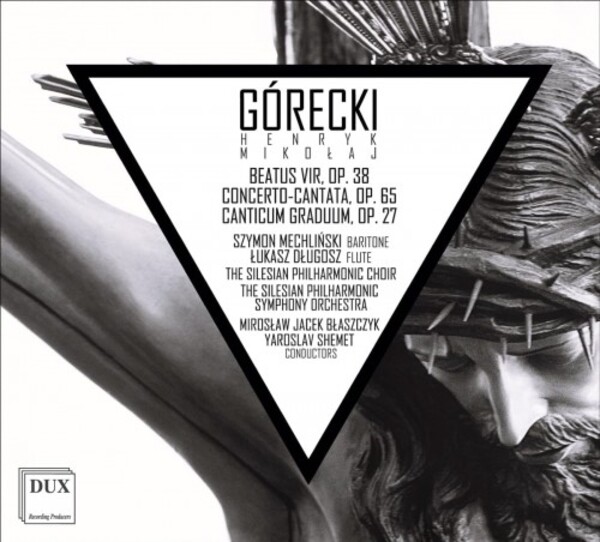
Gorecki - Beatus vir, Concerto-Cantata, Canticum graduum
£14.20
In stock - available for despatch within 1 working day
Despatch Information
This despatch estimate is based on information from both our own stock and the UK supplier's stock.
If ordering multiple items, we will aim to send everything together so the longest despatch estimate will apply to the complete order.
If you would rather receive certain items more quickly, please place them on a separate order.
If any unexpected delays occur, we will keep you informed of progress via email and not allow other items on the order to be held up.
If you would prefer to receive everything together regardless of any delay, please let us know via email.
Pre-orders will be despatched as close as possible to the release date.
Label: Dux
Cat No: DUX1737
Format: CD
Number of Discs: 1
Release Date: 3rd March 2023
Contents
Artists
Szymon Mechlinski (baritone)Lukasz Dlugosz (flute)
Silesian Philharmonic Choir
Silesian Philharmonic Symphony Orchestra
Conductors
Miroslaw Jacek BlaszczykYaroslav Shemet
Works
Beatus vir, op.38Canticum graduum, op.27
Concerto-Cantata, op.65
Artists
Szymon Mechlinski (baritone)Lukasz Dlugosz (flute)
Silesian Philharmonic Choir
Silesian Philharmonic Symphony Orchestra
Conductors
Miroslaw Jacek BlaszczykYaroslav Shemet
About
Górecki's Beatus vir, psalm for solo baritone, mixed choir, and large orchestra, op.38, to a text drawn from five psalms, was created on commission of Karol Wojtyła, the then metropolitan bishop of Krakow, on the occasion of the 900th anniversary of the death of St Stanislaus. It was first performed during the first papal visit of John Paul II to Poland in 1979. In the Beatus vir, Górecki, in particular, fulfilled his desire to write a larger piece for choir and orchestra that would use and clearly refer to the well-known church traditions, beloved by him. The piece is permeated with harmonic arrangements, melodic phrases, and repeated textual psalmody, which are immediately understood by Polish listeners. Pope John Paul II commended the Beatus vir, thanking Górecki publicly for providing such a deep experience.
The Concerto-Cantata was commissioned by an American flautist of Slovak origin, Carol Wincenc, and consists of four expressively distinctive movements. The Recitativo, which opens the concerto, is a five-minute slow solo of the alto flute; the Arioso; a contrasting third movement, Concertino, which is a spontaneous, almost wild dance; and the fourth movement – a spiritual Arioso e corale.
The Canticum graduum was commissioned by the West German Radio Symphony Orchestra and dedicated to Otto Tomek, an editor of the radio station who was extremely kind to Polish music. Unlike the Old Polish Music, which operates with strong textural contrasts, the Canticum graduum is a sonically homogeneous piece.
Reviews
 these works, in these remarkable recordings, are as fresh today as when they were written, and it is wonderful to see that their power is not lost on younger generations of musicians.
these works, in these remarkable recordings, are as fresh today as when they were written, and it is wonderful to see that their power is not lost on younger generations of musicians. The performances here are all clearly dedicated and assured. […] Those who would like to explore Górecki beyond the third symphony should consider this.
The performances here are all clearly dedicated and assured. […] Those who would like to explore Górecki beyond the third symphony should consider this.Error on this page? Let us know here
Need more information on this product? Click here